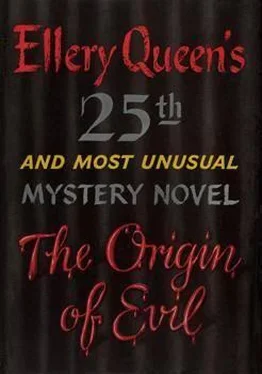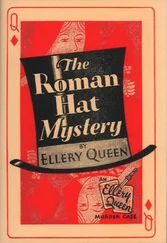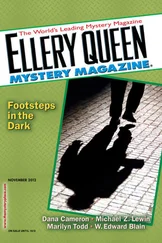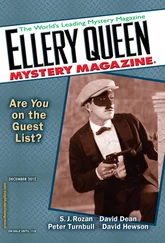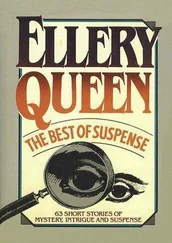“As for what the dog died of, an attendant at the Pound remembered the animal and he expressed the opinion that Frank had died of poisoning. Asked if it could have been arsenic poisoning, the man said, yes, it could have been arsenic poisoning. In the absence of an analysis of the remains, the opinion is worthless. All we can do is speculate that the dog was fed something with arsenic in it, which is interesting as speculation but meaningless as evidence. And that’s the story of the dead dog, Laurel. You can forget it.”
“I’ll help wherever I can,” said Laurel in a subdued voice. “And again, Ellery ― I’m sorry.”
“No need to be. My fault for not having kept you up to date.” Ellery put his arm around her, and she smiled faintly. “Oh, Mac,” he said. “There’s something personal I want to say to Laurel. Would you mind giving me a couple of minutes with her alone?”
“Seems to me,” grumbled the giant, rising, “as a bloodhound you’ve got a hell of a wolf strain in you, Queen.” His jaw protruded. “Lay off my mother, hear me? Or I’ll crack your clavicles for soup!”
“Oh, stop gibbering, Mac,” said Laurel quickly.
“Laur, do you want to be alone with this character?”
“Wait for me in the car.”
Mac almost tore the front door off its hinges.
“Mac is something like a great Dane himself,” Laurel murmured, her back to the door. “Huge, honest, and a little dumb. What is it, Ellery?”
“Dumb about what, Laurel?” Ellery eyed her. “About me? That wasn’t dumb. I admit I’ve found Delia Priam very attractive.”
“I didn’t mean dumb about you.” Laurel shook her head. “Never mind, Ellery. What did you want?”
“Dumb about Delia? Laurel, you know something about Mac’s mother―”
“If it’s Delia you want to question me about, I― I can’t answer. May I go now, please?”
“Right away.” Ellery put his hand on the doorknob, looking down at her cinnamon hair. “You know, Laurel, Lieutenant Keats has done some work at your house, too.”
Her eyes flew to his. “What do you mean?”
“Questioning your housekeeper, the chauffeur, the houseman.”
“They didn’t say anything about me!”
“You’re dealing with a professional, Laurel, and a very good one. They didn’t realize they were being pumped.” His eyes were grave. “A few weeks ago you lost or mislaid a small silver box, Laurel. A sort of pillbox.” She had gone pale, but her voice was steady. “That’s right.”
“From the description Mrs. Monk, Simeon, and Ichiro gave ― you’d asked them to look for it ― the box must have been about the same size and shape as the one you told me contained the warning note to your father. Keats wanted to quiz you about it immediately, but I told him I’d handle it myself. Laurel, was it your silver box that was attached to the collar of Henderson’s defunct dog?”
“I don’t know.”
“Why didn’t you mention to me the fact that a box of the same description belonging to you had disappeared shortly before June second?”
“Because I was sure it couldn’t have been the same one. The very idea was ridiculous. How could it have been my box? I got it at the May Company, and I think The Broadway and other department stores have been carrying it, too. It’s advertised for carrying vitamin tablets and things like that. There must have been thousands of them sold all over Los Angeles. I really bought it to give to Daddy. He had to take certain pills and he could have carried this around in his watch pocket. But I mislaid it―”
“Could it have been your pillbox?”
“I suppose it could, but―”
“And you never found the one you lost?”
She looked at him, worried. “Do you suppose it was?”
“I’m not supposing much of anything yet, Laurel. Just trying to get things orderly. Or just trying to get things.” Ellery opened the door and looked out cautiously. “Be sure to tell your muscular admirer that I’m returning you to him virgo intacto. I’m sort of sentimental about my clavicles.” He smiled and squeezed her fingers.
He watched until they were out of sight around the lower curve of the hill, not smiling at all.
Ellery went down to his cold supper and chewed away. The cottage was cheerlessly silent. His jaws made sounds.
Then there was a different sound.
A tap on the kitchen door?
Ellery stared. “Come in?”
And there she was.
“Delia.” He got out of his chair, still holding the knife and fork.
She was in a long loose coat of some dark blue material. It had a turned-up collar which framed her head. She stood with her back against the door, looking about the room.
“I’ve been waiting in the back garden in the dark. I saw Laurel’s car. And after Laurel and... Crowe drove away I thought I’d better wait a little longer. I wasn’t sure that your housekeeper was gone.”
“She’s gone.”
“That’s good.” She laughed.
“Where is your car, Delia?”
“I left it in a side lane at the bottom of the hill. Walked up. Ellery, this is a darling kitchen―”
“Discreet,” said Ellery. Fie had not stirred.
“Aren’t you going to ask me in?”
He said slowly, “I don’t think I’m going to.”
Her smile withered. But then it burgeoned again. “Oh, don’t sound so serious. I was passing by and I thought I’d drop in and see how you were getting on―”
“With the case.”
“Of course.” She had dimples. Funny, he had never noticed them before.
“This isn’t a good idea, Delia.”
“What isn’t?”
“This is a small town, Delia, and it’s all eyes and ears. It doesn’t take much in Hollywood to destroy a woman’s reputation.”
“Oh, that.” She was silent. Then she showed her teeth. “Of course, you’re right. It was stupid of me. It’s just that sometimes...” She stopped, and she shivered suddenly.
“Sometimes what, Delia?”
“Nothing. I’m going. ― Is there anything new?”
“Just that business about the rat poison.”
She shrugged. “I really thought there were mice.”
“Of course.”
“Good night, Ellery.”
“Good night, Delia.”
He did not offer to walk her down the hill and she did not seem to expect it.
He stared at the kitchen door for a long time.
Then he went upstairs and poured himself a stiff drink.
At three in the morning Ellery gave up trying to sleep and crawled out of bed. He turned on the lights in the living room, loaded and fired his brier, turned the lights out, and sat down to watch Hollywood glimmer scantily below. Light always disturbed him when he was groping in the dark.
And he was groping, and this was darkness.
Of course, it was a puzzling case. But puzzle was merely the absence of answer. Answer it, and the puzzle vanished. Nor was he bothered by the nimbus of fantasy which surrounded the case like a Los Angeles daybreak fog. All crimes were fantastic insofar as they expressed what most people merely dreamed about. The dream of the unknown enemy had been twenty years or more in the making...
He clucked to himself in the darkness. Back to the writer of the note.
The wonder was not that he made gifts of poisoned dogs and wrote odd notes relishing slow death and promising mysterious warnings with special meanings. The wonder was that he had been able to keep his hatred alive for almost a generation; and that was not fantasy, but sober pathology.
Fantasy was variance from normal experience, a matter of degree. Hollywood had always attracted its disproportionate quota of variants from the norm. In Vandalia, Illinois, Roger Priam would have been encysted in the community like a foreign substance, but in the Southern California canyons he was peculiarly soluble. There might be Delia Priams in Seattle, but in the houri paradise of Hollywood she belonged, the female archetype from whom all desire sprang. And Tree Boy, who in New York would have been dragged off to the observation ward of Bellevue Hospital, was here just another object of civic admiration, rating columns of good-natured newspaper space.
Читать дальше
